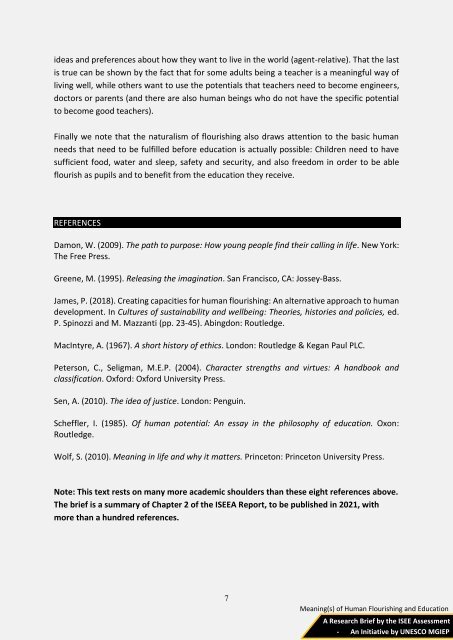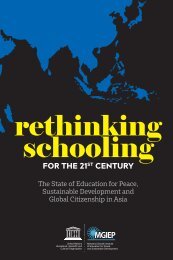Flourishing and Education
This short paper provides a definition of human flourishing, education, learning, teaching and student evaluation, more commonly known as student assessment. These definitions and their relationship with each other set the context of the International Science and Evidence based Education (ISEE) Assessment. The ISEE Assessment, an initiative by the UNESCO Mahatma Gandhi Institute of Education for Peace and Sustainable Development (MGIEP), was designed to provide the science and evidence support to UNESCO’s Futures of Education initiative.
This short paper provides a definition of human flourishing, education, learning, teaching and student evaluation, more commonly known as student assessment. These definitions and their relationship with each other set the context of the International Science and Evidence based Education (ISEE) Assessment. The ISEE Assessment, an initiative by the UNESCO Mahatma Gandhi Institute of Education for Peace and Sustainable Development (MGIEP), was designed to provide the science and evidence support to UNESCO’s Futures of Education initiative.
Create successful ePaper yourself
Turn your PDF publications into a flip-book with our unique Google optimized e-Paper software.
ideas <strong>and</strong> preferences about how they want to live in the world (agent-relative). That the last<br />
is true can be shown by the fact that for some adults being a teacher is a meaningful way of<br />
living well, while others want to use the potentials that teachers need to become engineers,<br />
doctors or parents (<strong>and</strong> there are also human beings who do not have the specific potential<br />
to become good teachers).<br />
Finally we note that the naturalism of flourishing also draws attention to the basic human<br />
needs that need to be fulfilled before education is actually possible: Children need to have<br />
sufficient food, water <strong>and</strong> sleep, safety <strong>and</strong> security, <strong>and</strong> also freedom in order to be able<br />
flourish as pupils <strong>and</strong> to benefit from the education they receive.<br />
REFERENCES<br />
Damon, W. (2009). The path to purpose: How young people find their calling in life. New York:<br />
The Free Press.<br />
Greene, M. (1995). Releasing the imagination. San Francisco, CA: Jossey-Bass.<br />
James, P. (2018). Creating capacities for human flourishing: An alternative approach to human<br />
development. In Cultures of sustainability <strong>and</strong> wellbeing: Theories, histories <strong>and</strong> policies, ed.<br />
P. Spinozzi <strong>and</strong> M. Mazzanti (pp. 23-45). Abingdon: Routledge.<br />
MacIntyre, A. (1967). A short history of ethics. London: Routledge & Kegan Paul PLC.<br />
Peterson, C., Seligman, M.E.P. (2004). Character strengths <strong>and</strong> virtues: A h<strong>and</strong>book <strong>and</strong><br />
classification. Oxford: Oxford University Press.<br />
Sen, A. (2010). The idea of justice. London: Penguin.<br />
Scheffler, I. (1985). Of human potential: An essay in the philosophy of education. Oxon:<br />
Routledge.<br />
Wolf, S. (2010). Meaning in life <strong>and</strong> why it matters. Princeton: Princeton University Press.<br />
Note: This text rests on many more academic shoulders than these eight references above.<br />
The brief is a summary of Chapter 2 of the ISEEA Report, to be published in 2021, with<br />
more than a hundred references.<br />
7<br />
Meaning(s) of Human <strong>Flourishing</strong> <strong>and</strong> <strong>Education</strong><br />
A Research Brief by the ISEE Assessment<br />
- An Initiative by UNESCO MGIEP

















